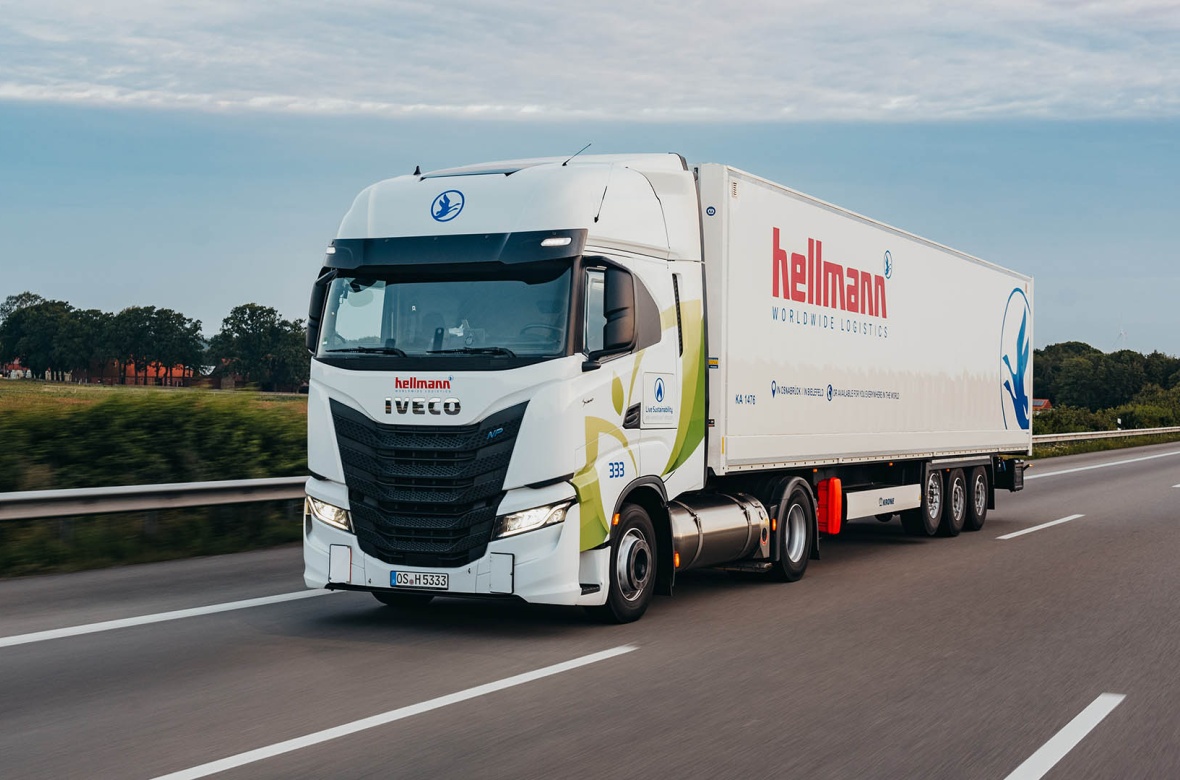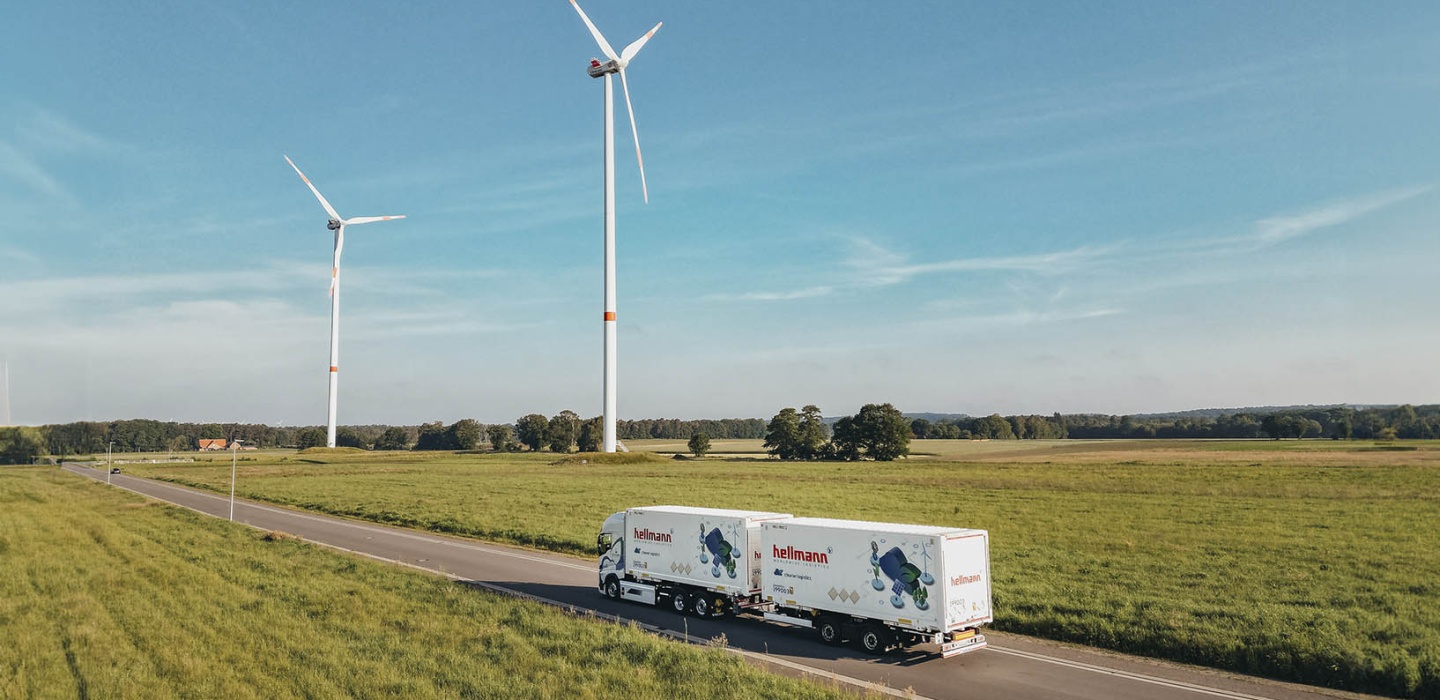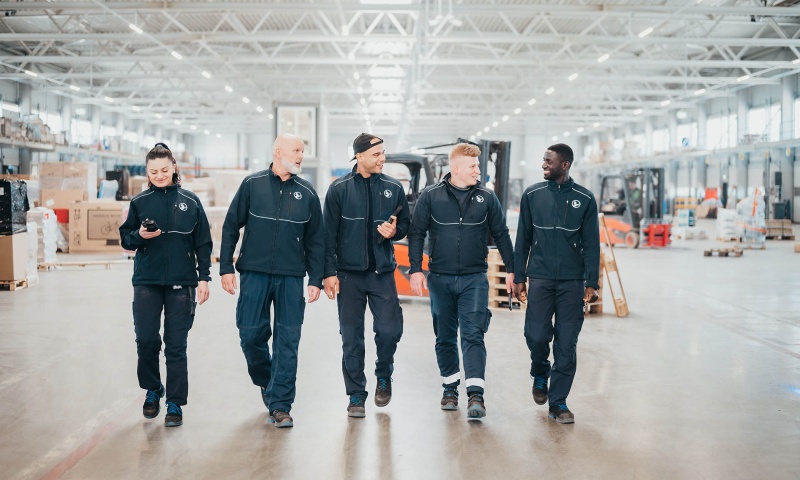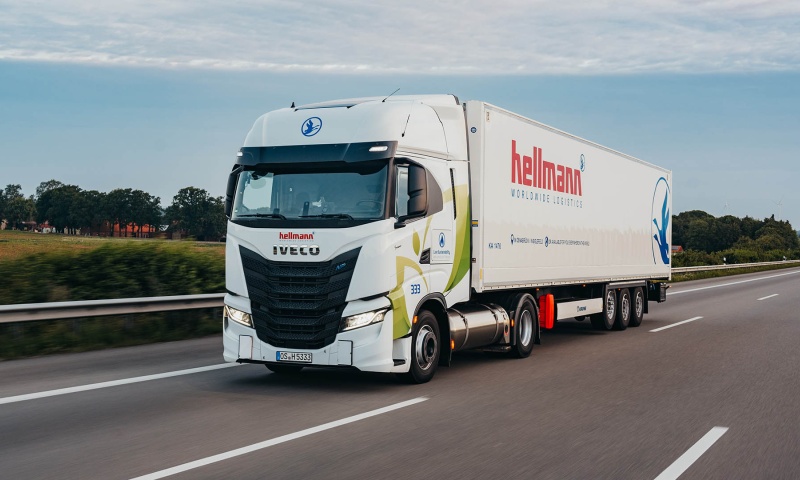
Environment
For logistics companies, energy consumption and emissions are important factors for sustainable development.

Stefan Borggreve, Chief Digital Officer
For logistics companies, reducing energy consumption and emissions are key factors when it comes to sustainable business. We bear great responsibility for our climate! This means more than just using environmentally friendly technologies: We need to digitize ourselves to avoid unnecessary transport through intelligent planning! This will enable us to reduce CO2 quickly and efficiently and offer our customers smart and individual solutions with high quality«, said Stefan Borggreve, who has been a member of the Hellmann Management Board as Chief Digital Officer since the beginning of 2024 and is responsible for innovation, digitalization and sustainability.«
Energy
Our energy consumption is a key environmental aspect of our integrated management systems. At the same time, it is also essential for our sustainable development and fundamental for determining our ecological footprint. This requires all company units to be sensitive with regard to the individual handling of energy consumption and the recording of dedicated consumption figures in order to create the basis for a sustainable reduction.
...read more
For this reason, we integrate the topic of energy into all relevant management systems at Hellmann in accordance with European legislation – i.e., the European Energy Efficiency Directive and its interpretation in the member states. On this basis, we operate an energy management system in accordance with ISO 50001 in almost all branches in Germany and the UK.
Regular energy audits by qualified personnel and sequential energy assessments are an integral part of this management system in order to identify consumption drivers and determine potential savings. The feasibility of corresponding measures is also examined as part of this process.
The basis for any optimization and reduction in consumption is transparency. That is why we at Hellmann record global energy consumption centrally and in line with the key financial figures for our business units. While our company’s main entities of the company were recorded in 2022, we were able to significantly expand the focus in 2023 so that almost all units are now integrated into the reporting and their data is included in the calculation of our ecological footprint. For 2024, we have set ourselves the goal of further improving data quality through the increasing use of digital meters.
OUR ENERGY CONSUMPTION IN 2023

Due to the gradual expansion of the energy consumption figures, we assume that the total consumption figures for 2023 represent a new starting point and therefore cannot be compared with the previous year‘s figures in quantitative terms.
Building-related consumers are a key driver of energy consumption, with heating systems representing a crucial factor. We attach great importance to installing modern heating systems, for example with heat pump technology, when making structural changes and thus replacing conventional systems that run on fossil fuels. At the same time, we are
increasingly relying on solar energy, for example at our warehouse in Bremen, where a photovoltaic system covers an area of 7,460 m² on the roof and generates around 670,000 kWh of clean electricity every year. This is equivalent to supplying more than 200 households with green electricity. By harnessing the power of the sun, we are reducing our CO2 footprint and taking concrete steps toward a more sustainable future. This can also be seen in the consumption curves of recent years. To further reduce energy consumption, we use economical LED lighting in our buildings and high-frequency lithium-ion batteries for industrial trucks in our warehouses.
Ultimately, our approximately 12,237 employees worldwide also have a significant influence on our company‘s energy consumption. They are aware of their responsibility thanks to regular training, continuing education, and various awareness-raising measures. In the reporting year, training courses were also held in Germany for our QHSE and energy officers in relation to the integrated management systems, including ISO 50001. We continuously adapt the training content to constantly evolving conditions and legislation.
In addition to the goal of improving qualitative data, we have also resolved to agree on specific targets for energy consumption with the regions and countries in the coming reporting year that support our sustainability goals and the science-based targets (SBTi) anchored therein.

Emissions
The reduction of emissions is another key aspect for us at Hellmann and a central strategic goal with regard to our future ecologically sustainable orientation. The key factors here are the reduction potential in the area of energy, as there is a direct link between energy consumption and the resulting emissions.
...read more
We make a fundamental distinction between company-specific and product or service-specific emissions. In 2022, the Company Carbon Footprint (CCF), i.e., our company’s CO2 footprint, was already published for Scopes 1&2 in our Sustainability Report, whereby the company units with the greatest impact were initially taken into account. In 2023, the recording of direct and indirect emissions for Scopes 1&2 was integrated into the management information system and transferred to the regular reporting, meaning that all company units were included in this period. Due to the expanded data situation, it is not possible to derive trends compared to the previous year. The product carbon footprint (PCF) describes the ecological footprint of a service or product in its entirety, i.e., in the case of logistics along the entire supply chain. This value is of particular interest to customers and external stakeholders, as they require the information for their own sustainability reporting and the output of their own company footprint. The PCF is therefore an important criterion for selecting and evaluating logistics service providers.
In accounting for company-specific emissions, the company is guided by the three scopes of the Greenhouse Gas Protocol. Hellmann is preparing an emissions report for the 2023 reporting year for direct emissions (Scope 1) and indirect emissions from its own electricity consumption (Scope 2). For the first time, the company is partially presenting Scope 3 emissions in its sustainability reporting. The transportrelated emissions, which are mapped by third parties on the various modes of transport, are included in the emissions accounting.




Emission transparency and accounting therefore play a key role and are subject to the recognized guidelines and standards of the Greenhouse Gas Protocol (GHG) as well as the logistics-specific implementations according to the European standard EN 16258 and the GLEC (Global Logistic Emission Council) framework. In 2023, the new ISO 14083 was also adopted, which will be given greater consideration in the future. We are preparing for its implementation together with industry associations, customers, and partners. In addition to the transparent calculation of emissions, their reduction is a key issue in our strategic corporate orientation. In addition to the use of climatefriendly technologies, the aim is to avoid emissions by increasing capacity utilization and making more efficient use of transport capacities. The aim is therefore to intelligently bundle transports through digitalized processes.
Relocation and combined transport as an efficient tool for CO₂ reduction
We are actively promoting the development and expansion of environmentally friendly intermodal transport in order to keep emissions as low as possible by shifting and/or combining modes of transport. In 2023, we were able to shift almost 37,000 truck transports from road to rail in Germany alone, saving a total of 22,122 tons of CO2e together with our combined transport (road + rail).
Sea/air shipments also offer us the opportunity to significantly reduce emissions by shifting shipments to the sea. For example, shipments between Asia and Europe are routed via the Dubai hub. The first leg is carried out by ship, which has significantly lower emissions per transported ton of weight than an airplane. The containerized freight is then deconsolidated in Dubai and transported to its destination by air freight. Overall, this intermodal solution offers a savings potential of around 40% (there may be deviations depending on the routing and destination). If an air freight shipment is transported entirely by sea freight, emission savings of 95% and more are possible.
At the same time, Hellmann is always looking for innovative approaches to incorporate more sustainable solutions into its portfolio “out of the box.” For example, we have teamed up with the drone manufacturer Dronamics to offer faster and more environmentally friendly air freight via unmanned remotecontrolled freight drones. The cargo drone solution from Dronamics reduces CO2 emissions by up to 60% and is on its way to becoming a net-zero solution thanks to innovative technologies under development. The first test flights are planned for 2024.
Alternative Fuels and Transparency Reduce Climate-Damaging Emissions
We also reduce unavoidable emissions by using alternative fuels. In air freight, we offer our customers sustainable aviation fuel (SAF), which has a reduction potential of around 80% compared to conventional kerosene. The origin of the SAF feedstock (raw material) is of great importance. We therefore offer our customers SAF certificates from organic feedstock. We also offer even more accurate emissions calculations for air freight as a mode of transport via the SmartAir! internet platform, which we helped to develop, because more precise data is available on routing and the types of aircraft used. The strategic goal for 2024 is to further improve the quality of emissions calculations and to integrate them more closely into proactive systems.
Biofuels also currently offer the greatest savings potential in sea freight. Sustainable marine fuel (SMF) can be used in the book and claim process to generate reductions of varying amounts, depending on the type of certified biofuel. This means we can also offer CO2- neutral shipments by sea. In addition, the total emissions for LCL sea transport from the second half of the year, amounting to 3,845 tons of CO2, were fully offset via compensation projects in cooperation with MyClimate. Based on the emissions data, we are currently developing alternatives to existing products to further reduce emissions.
We also use biofuels for road transport by truck. Since November 2023, we have been sourcing bio-LNG from renewable energy sources for our LNG (liquefied natural gas) fleet. As a result, a reduction of 247t CO2e was certified for the first two months. At the same time, we gained initial experience with electromobility in heavy goods transport. In the test, an electrically powered truck was used on the “last mile”, i.e., for the delivery and collection of general cargo from customers. The vehicle, which has an approximate range of 200 km, achieved good test results, and the drivers rated it very positively. We are planning to purchase our own electric trucks in 2024 to significantly advance the environmentally friendly transformation of our own fleet.
Hellmann uses the EcoTransIT software solution for shipment-related emissions accounting. In addition, it is our declared aim to also include primary data in emissions accounting. For this reason, we have entered into a partnership with the start-up Shipzero and can therefore retrieve real consumption data from the telematics system for truck transports and use this as the basis for the calculation. The proportion of this data is to be increased in 2024 and the project will be continued.
Reducing Emissions as a Social Challenge
Hellmann is aware of its responsibility and, in addition to the direct product-specific approaches mentioned above, also relies on other measures to sustainably reduce its emissions and exert a positive influence. For example, the company purchases emission-free electricity at all German locations and thus consumes 100% CO2-neutral electricity with regard to this energy source. In total, around 6,785 tons less CO2 are emitted per year compared to the conventional German electricity mix. The aim is to transfer this approach to other countries in the future.
In addition to the direct savings potential that we see at Hellmann to significantly reduce our emissions, we also assume social responsibility. One issue we are committed to is air pollution in urban areas: Colleagues from Hellmann India have teamed up with the “Youth for Ecological Sustainability” initiative to raise awareness of the problem by launching the “Delhi Run for Clean Air”. Around 500 young people took part in the Hellmann-sponsored run through the Indian capital.
Another initiative was supported by our team in Sri Lanka, which planted 100 new trees in the Horakale forest in Mirigama. In Costa Rica, Hellmann has also planted a total of 800 trees on the Cerro del Espiritu Santo hill in Naranjo in recent years. These measures are an expression of our joint commitment to climate protection. With every tree planted, we promote biodiversity, improve air quality, and make a small contribution to mitigating climate change.





